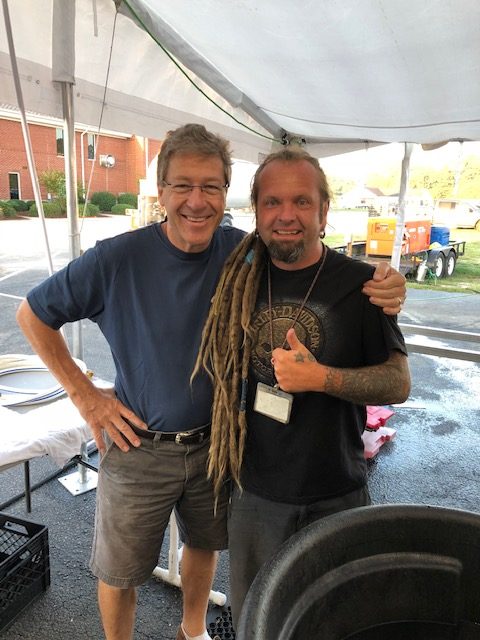November 2018
The minute I saw Chris I knew I wanted to have nothing to do with him.
Dreadlocks, pierced ears, tattoos on arms and legs.
Who was this guy and how was I going to avoid him for the next five days?
Hurricane Florence brought both of us to Lumberton, North Carolina. We were there to serve the people who had been impacted by a devastating natural disaster. I didn’t know it at the time, but Chris was at the exact location two years earlier helping the local residents deal with Hurricane Matthew.
Chris was with the Red Cross and I was there with a small church group from Charlotte. The disaster relief station had around 100 volunteers serving up to 18,000 meals a day and de-mudding 400 houses. It was hard work with 12-hour shifts.
I was part of the kitchen crew, washing cooking utensils and hundreds of plastic containers that were sent out into the impacted areas, filled with food. Chris must have been in logistics because I always saw him darting across the huge parking lot, directing semi-trucks, unloading incoming supplies and sending off Red Cross trucks filled with life-giving provisions.
For the first three days I just observed him. Like I said, I wasn’t interested in getting to know him. He gave me the creeps!
As I watched I noticed that people really seemed to like him. He always smiled and he made others laugh. He was an encourager and a helper. And, he worked, harder and longer then any of us. I joked with Keith, my cleaning buddy that this guy was and ox, lifting and stacking wooden pallets as if they were tooth picks. In the evening, after dinner, in the darkness, I saw Chris still working.
It wasn’t until the fourth day that I finally decided to meet Chris and find out more about him. He had been working for the Red Cross for over 10 years, moving from one disaster area to the next. He had a passion for helping people; making money wasn’t important to him. I asked him about his hair and how in the world he was able to wash it. We had a lot of good laughs over the course of the next two days. Chris had a heart of gold even though his exterior looked a bit tarnished to me.
Unconscious bias is a form of social categorization, whereby we sort people into specific groups. Fundamentally, it is a way to keep us out of harms way. You know the saying: “it’s better to be safe than sorry.†So we avoid situations or people that don’t fit our idea of the world, as it should be. But why do we do this?
Scientists have estimated that our brains take in 11 million pieces of information at any one time, but our brains can only deal with about 40 pieces of information. So what does our brain do? It filters out everything that we don’t need, or that doesn’t fit right. It helps to keep us in our comfort zone. So my brain was telling me, stay clear of Chris because he is so different from you and he will make you feel uncomfortable.
Today I’ll walk Max (my dog) through the neighborhood. We’ll enjoy the beautiful cool air and the sunshine. And then I’ll see one of those political yard signs supporting a candidate I don’t agree with. My mind automatically informs me that the people who live in this house are misinformed idiots who need to wake up. Why would I want to even know them?
Maybe, just maybe, they’re a bit like Chris from the Red Cross, a guy I almost missed getting to know.
We all have biases; that’s just how we humans are wired. In a way it makes the world boring. Only if we can challenge our own thinking, question our stereotypes and move toward those who look different from us, does life get really interesting.
